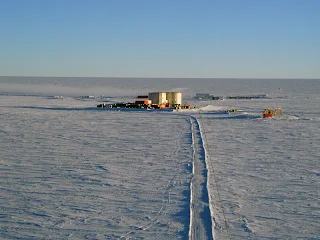 | |
|
What has the Curiousity rover found on Mars? The Mars Science Laboratory team has made some tantalizing hints about a "historic" and "Earth-shaking discovery made in a Martian soil sample.
We won't actually know what they found until it's announced at the American Geophysical Union meeting in early December. Some intriguing possibilities are organic compounds, liquid water, or even microbial life. Hopefully the announcement will live up to the speculation.
(Update 11/27: NASA's "historic news" turns out to be a misunderstanding. No big announcement forthcoming, alas.)
Even if it turns out that something less spectacular than life, any major finding is sure to inspire more calls for a manned mission to Mars. Humans, the argument goes, are more adaptable than mere machines. But I think the real appeal is to expand the boundaries of human territory and to say that we've been able to do it.
 |
| Artist's conception of manned exploration of Pavonis Mons on Mars. Artist:Pat Rawlings for NASA |
Of course the space ships are still under development. It's not clear when they would be ready for even a small-scale mission with a crew of ten.
And then there's the human factor. At least the first few manned missions to Mars are likely to be relatively rough compared to what later colonists are likely to experience. The journey would take anywhere from 150-300 days, with extended periods of weightlessness and - possibly more importantly - extreme isolation for the crew.
And then there's the human factor. At least the first few manned missions to Mars are likely to be relatively rough compared to what later colonists are likely to experience. The journey would take anywhere from 150-300 days, with extended periods of weightlessness and - possibly more importantly - extreme isolation for the crew.
The astronauts aboard the International Space Station have been carefully monitored to help understand the physiological effects of living in microgravity. It takes a serious toll on the human body: bone and muscle mass are lost, vision can degrade, and some astronauts suffer debilitating space sickness.
But up until now stays aboard the ISS have be relatively short. It was just announced that two astronauts - American Scott Kelly and Russian Mikhail Kornienko - are scheduled to begin a year-long stay on the ISS in early 2015. Tests and experiments will be run to determine the physiological effects of such a long stay in space. That will hopefully give scientists a better idea if the human body will be able to tolerate a long journey to Mars under weightless conditions.
And the effects of living in isolation with a small group are being tested in Antarctica. The scientists at Concordia Research Station in Antarctica are completely isolated for nine months of the year in the most extreme environment on Earth. Even in summer the outdoor temperatures rarely rise about -25°C. In the winter the temperature can fall to -80°C (-112°F) and there is darkness around the clock.
The scientists at Concordia are well aware that their experiences model the psychological pressures the crew of a manned mission to Mars will experience. In an article for the New York Times, physician and researcher Alexander Kumar explained what it's like to return to civilization after a stint there. He notes:

 I admit I really like the idea of a human colony on Mars, but I'm not sure if that's just a romantic notion from having read too many science fiction novels. Even Kim Stanley Robinson's Red Mars, which shows the terrible difficulties - both human and technical - of colonizing Mars doesn't suggest we shouldn't try to go there in the first place. Even if it's hard I think we should go.
I admit I really like the idea of a human colony on Mars, but I'm not sure if that's just a romantic notion from having read too many science fiction novels. Even Kim Stanley Robinson's Red Mars, which shows the terrible difficulties - both human and technical - of colonizing Mars doesn't suggest we shouldn't try to go there in the first place. Even if it's hard I think we should go.
And heck, if given the opportunity, I think I would go, even if there aren't little green men. I guess I should be saving up so that I have a spare $500,000 when tickets go on sale.
 |
| Concordia Research Station Source: StephenHudson on Wikimedia Commons. Public domain. |
The scientists at Concordia are well aware that their experiences model the psychological pressures the crew of a manned mission to Mars will experience. In an article for the New York Times, physician and researcher Alexander Kumar explained what it's like to return to civilization after a stint there. He notes:
"I have learned a lot about Antarctica, myself and, of course, what might lie ahead on Mars. If we can make the journey, why would we go? And, as we have debated into the wee night hours, should we go?"I think that's the ultimate question: even if we can make a Mars should we expend the resources and risk the lives of astronauts to do so? And would the discovery of possible life on Mars make a difference?
And heck, if given the opportunity, I think I would go, even if there aren't little green men. I guess I should be saving up so that I have a spare $500,000 when tickets go on sale.




No comments:
Post a Comment
I've turned on comment moderation on posts older than 30 days. Your (non-spammy) comment should appear when I've had a chance to review it.